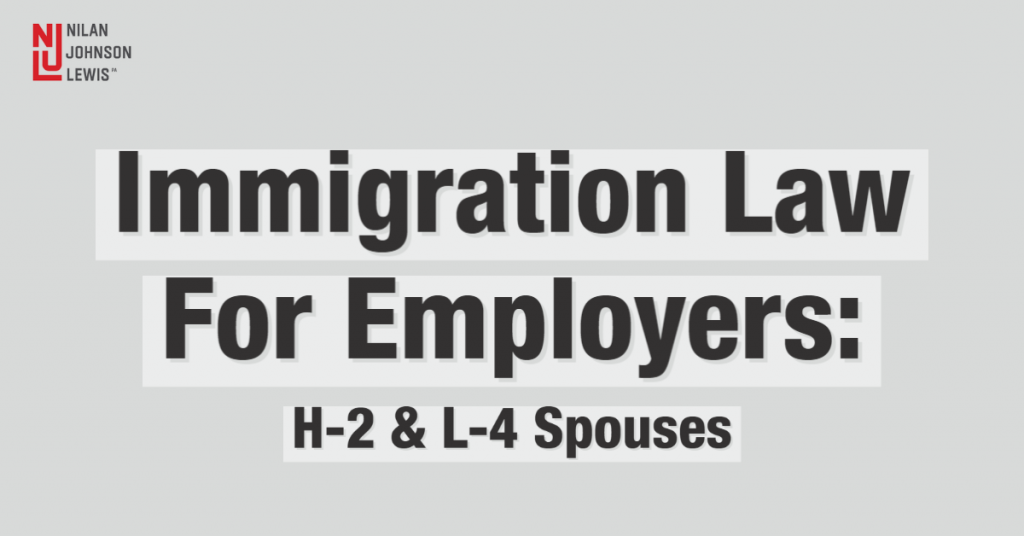
Posted November 10th, 2021 in Top Stories, Legal Insights with Tags Immigration Law, Corporate Immigration
DHS Settlement Provides Long-Awaited Changes for H-4 and L-2 Spouse Work Authorization
Spouses of H-1B and L-1 workers have long faced protracted delays by the U.S. Citizenship & Immigration Services (USCIS) in processing their work authorization (EAD) renewals. The wait has sometimes exceeded more than a year, resulting in the existing EAD expiring well before a decision is made. This causes hardship for both employers and individuals, with employers having to take valuable employees off payroll and individuals facing the stress of losing employment and providing financial support to their families.
In September 2021, plaintiffs brought a putative class action against the U.S. Department of Homeland Security (DHS) to remedy these types of employment authorization issues for H-4 and L-2 spouses. The result is a settlement agreement that came down on November 10, 2021, in the case of Shergill et al. vs. Mayorkas. The settlement marks a major step in what has been long-awaited change in USCIS’s position with respect to H-4 and L-2 work authorization.
In short, USCIS will be changing its EAD policies for H-4 and L-2 spouses as a result of today’s settlement.
H-4 Spouses
Under the settlement, some H-4 spouses will receive an automatic extension of their work authorization in the United States for up to 180 days. However, the settlement has a narrow application, and the automatic 180-day employment authorization will apply only if qualifying H-4 spouses:
- properly file an application to renew their H-4 based employment authorization document (EAD) before the current EAD expires;
- have an unexpired Form I-94 showing their status as an H-4 nonimmigrant; and
- will continue to have H-4 status beyond the expiration date of their EAD.
NOTE: Immigration regulations provide that the 180-day extension can only attach to an expired EAD if the classification on which that EAD is based does not require the adjudication of an underlying application or petition. In most cases, H-4 EADs require the adjudication of an underlying application to extend H-4 status. For this reason, the mere filing of an EAD renewal application does not, itself, grant an automatic 180-day work authorization extension, even with a concurrent filing of an application to extend H-4 status. The rule only applies to those who hold H-4 status at the time of filing the EAD extension application AND who will continue to have H-4 status beyond the expiration of the EAD.
The agreement is still significant because it will afford work authorization for qualifying H-4 spouses in this situation for up to six months (180 days) while awaiting a decision on their EAD renewal application.
L-2 Spouses
In addition, USCIS will now recognize that L-2 spouses have automatic work authorization incident to status, meaning they will no longer have to apply for an EAD in order to work in the United States.
For L-2 spouses who do file an EAD renewal, they — like H-4 spouses above — will similarly receive an automatic extension of work authorization for up to 180 days, upon the timely filing of the EAD application and if they continue to have L-2 status beyond the expiration date of their EAD.
I-9
Both employers and H-4/L-2 spouses covered under the settlement should be aware of the documents that can be presented to complete Form I-9 and satisfy Form I-9 requirements. These are listed below:
- H-4: Settlement indicates H-4 spouses may present the following combination to employers:
- A facially expired EAD indicating class (c)(26);
- Form I-797C Notice of Action for Form I-765 with class requested of (c)(26) and, further, showing EAD renewal application was filed before existing EAD expired; and,
- Unexpired Form I-94, showing valid H-4 status.
- L-2: Settlement indicates L-2 spouses may present the following combination to employers:
-
- A facially expired EAD indicated class (a)(18);
- Form I-797C Notice of Action for Form I-765 with class requested of (a)(18) and, further, showing EAD renewal application was filed before existing EAD expired; and,
- Unexpired Form I-94, showing valid L-2 status.[1]
The effective date of the settlement is November 10, 2021, although the agreement indicates USCIS will issue appropriate policy guidance to employers and benefit granting agencies regarding the changes.
Nilan Johnson Lewis will monitor closely the timing and contents of the policy guidance by USCIS and provide further updates on what this means for employers and individuals with respect to H-4 and L-2 employment authorization in the United States. In the meantime, it is a welcome positive development.
[1] With respect to the I-94 record for L-2 spouses, under the settlement agreement, USCIS has 120 days from the effective date of the settlement on November 10, 2021 to coordinate with CBP as relevant to change I-94 records to indicate that the bearer is an L-2 spouse so that it can be used as a List C document for Form I-9 purposes.

